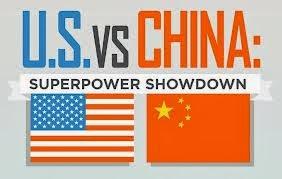 Se ne sentono tante sulla Cina...anche troppe...
Se ne sentono tante sulla Cina...anche troppe...e spesso di segno totalmente opposto.
La Cina come locomotiva Mondiale
La Cina come detonatore della prossima crisi atomico-finanziaria
La Cina come un faro.
La Cina come un black hole.
etc
In realtà nessuno ci capisce una benemerita CIPPA su 'sta Cina...
Infatti...è difficile se non impossibile
scorgere dietro alla CORTINA di uno Stato così complesso, contradditorio e poco trasparente.
Vedi per esempio la sempre più forte dicotomia
tra "sistema finanziario ombra" e sistema finanziario ufficiale
Anche questo argomento venne già affrontato in un mio post: La Cina ed il suo "sdoppiamento della personalità"... (questo, come sapete, non è un blog ma un'enciclopedia...)
E la "lotta" tra Finanza Centralizzata (statale?)
e Finanza Ombra (di mercato?)
continua...
- ho messo i punti interrogativi perchè in questo caso è difficile categorizzare -
Cina, in arrivo un nuovo giro di vite sulle banche?Difficile dunque fare analisi affidabili sulla Cina
Il governo cinese sarebbe pronto ad approvare norme ad hoc per vietare che gli istituti di credito riescano ad aggirare i limiti imposti all’erogazione di prestiti...
(non a caso anche IO che, spesso e volentieri, c'ho azzeccato...sulla Cina sono stato assai contradditorio...esattamente come la Cina stessa...o se preferite, esattamente come le informazioni che sulla Cina ci arrivano)
Una cosa però è certa.........................
.
la Cina sarà l'ago della bilancia della prossima Crisi
- sia nel caso che si rivelasse un detonatore = infatti, se la Cina dovesse entrare in seria Crisi, 3 secondi dopo il GIOCO salterebbe....e cadrebbero anche gli USA, l'Europa ed il comune di Roma....
- sia nel caso che dovesse man mano affrancarsi dalla Grande Bolla orchestrata in primis dalla FED e dunque dovesse decidere di non stare più al gioco...
ve lo anticipai nel mio post: ECCOVI UN PAIO DI DRITTE AGGRATIS...e poi...Caxxi Vostri!!
........QUANDO SCOPPIERA' DI NUOVOEd anche Bloomberg è uscita con un articolo interessante che fa intuire quale potrebbe essere la direzione che sta prendendo la Cina...
LA (ri)BOLLA USA
e scoppierà...prima o poi...
per es.....quando la Cina non starà più al gioco
e, con le riforme che sta introducendo, HA FATTO I PRIMI PASSI PER USCIRE DAL GIOCO.....
vedi mio post Prima o poi "uno spillo acuminato" bucherà la NUOVA BOLLA ma stavolta non saranno i Subprime (endogeni)
ALLORA
partirà uno Tsunami che coinvolgerà tutto il Mondo............
E la Chinaaaa?
vedi mio tweet
stefano bassi @grandebluffDunque....
STA A VEDERE CHE LA CINA DIVENTERA' +DEMOCRATICA E MENO COMUNISTA DELL'ITALIA..Borse cinesi volano su piano riforme http://www.borsainside.com/mercati_asiatici/2013/11/48050-le-borse-cinesi-volano-su-piano-riforme.shtm …
STRONG BUY CHINA????
FORSE....forse...
INKIODATA DA SECOLI INTORNO AI 2000 PT
PER CAUSE ENDOGENE e telecomandate
Però.....
pur nelle 1000 contraddizioni cinesi, nella bolla immobiliare, nello shadow banking e nel credito ombra, nell'immobiliare in bolla perchè cinesi fanno paccate di soldi ma possono INVESTIRE solo in pochi assets come gli permettono dall'ALTO...
SE SE SE..... questo stesse cambiando? e sta cambiando...
COSA SUCCEDEREBBE?
Cosa succederebbe a quella MASSA DI RICCHEZZA, LIQUIDITA'....se togliessero almeno in parte le BRIGLIE?....
Le borse cinesi volano su piano riforme
Shanghai ha guadagnato il 2,9% e Hong Kong il 2,7%.
Insomma...
in un modo o nell'altro DOBBIAMO TENERE D'OKKIO PECHINO&DINTORNI
invece di tanti altri temi di distrazione di massa.
PBOC Says No Longer in China’s Interest to Increase Reserves.
By Bloomberg News - Nov 21, 2013
The People’s Bank of China said the country does not benefit any more from increases in its foreign-currency holdings, adding to signs policy makers will rein in dollar purchases that limit the yuan’s appreciation.
“It’s no longer in China’s favor to accumulate foreign-exchange reserves,” Yi Gang, a deputy governor at the central bank, said in a speech organized by China Economists 50 Forum at Tsinghua University yesterday. The monetary authority will “basically” end normal intervention in the currency market and broaden the yuan’s daily trading range, Governor Zhou Xiaochuan wrote in an article in a guidebook explaining reforms outlined last week following a Communist Party meeting. Neither Yi nor Zhou gave a timeframe for any changes.
China’s foreign-exchange reserves surged $166 billion in the third quarter to a record $3.66 trillion, more than triple those of any other country and bigger than the gross domestic product of Germany, Europe’s largest economy. The increase suggested money poured into the nation’s assets even as developing nations from Brazil to India saw an exit of capital because of concern the Federal Reserve will taper stimulus.
Yi, who is also head of the State Administration of Foreign Exchange, said in the speech that the yuan’s appreciation benefits more people in China than it hurts.
‘Less Interventionist’
His comments are “consistent with the plans to increase the renminbi’s flexibility so they become less interventionist,” Sacha Tihanyi, senior currency strategist at Scotiabank in Hong Kong, said by phone today. The central bank may widen the yuan’s trading band in “the coming few months,” he added.
The yuan’s spot rate is allowed to diverge a maximum 1 percent on either side of a daily reference rate set by the People’s Bank of China. The trading range was doubled in April 2012, after being expanded from 0.3 percent in May 2007. The band could be widened to 2 percent, Hong Kong Apple Daily reported today, citing an interview with the Hong Kong Monetary Authority’s former chief executive Joseph Yam.
Capital inflows into China accelerated in October, official data suggest. Yuan positions at the nation’s financial institutions accumulated from foreign-exchange purchases, a gauge of capital flows, climbed 441.6 billion yuan ($72 billion), the most since January.
About half of October’s increase in the positions was attributable to surpluses in trade and foreign direct investment, with the rest accounted for by inflows of “hot money,” Goldman Sachs Group Inc. Hong Kong-based analysts MK Tang and Li Cui wrote in a Nov. 18 note.
Stronger Yuan
The yuan has appreciated 2.3 percent against the greenback this year, the best-performance of 24 emerging-market currencies tracked by Bloomberg. Non-deliverable 12-month forwards rose 0.2 percent this week and reached 6.1430 per dollar on Nov. 20, matching an all-time high recorded on Oct. 16. The currency was little changed at 6.0932 as of 10:33 a.m. in Shanghai today.
“It appears that many in the People’s Bank think the time is about right to scale back currency interventions,” Mark Williams, London-based chief Asia economist at Capital Economics Ltd., wrote in an e-mail yesterday. “But China has got itself into a situation where stopping intervention will be very hard to do” and comments such as Yi’s will spur speculative inflows, he added.
Less intervention and smaller gains in foreign-exchange reserves may damp China’s appetite for U.S. government debt. The nation is the largest foreign creditor to the U.S. and its holdings of Treasuries increased by $25.7 billion, or 2 percent, to $1.294 trillion in September, the biggest gain since February. U.S. government securities lost 2.6 percent this year, according to the Bloomberg U.S. Treasury Bond Index. (BUSY)
Yi’s comments didn’t imply China will be cutting its holdings of U.S. government debt, said Scotiabank’s Tihanyi. “They are probably going to keep their allocations reasonably stable unless there’s a big policy shift, but it means they will possibly be buying less at the margin,” he said.
Se trovate questo post interessante, siete invitati a condividerlo con i tasti "social" (Facebook, Twitter etc) che trovate subito dopo la fine del testo.
Sostieni l'informazione indipendente e di qualità





